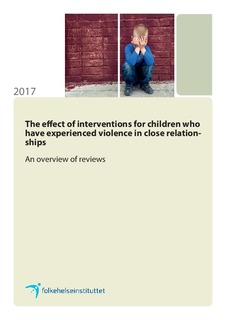| dc.description.abstract | Background
Violence against children is an important public health concern. Millions of children across the world experience violence. There is strong evidence linking early life violence to psychological problems (e.g. depression, anxiety) and behavioural problems (e.g. suicide attempts, self-harm, poor employment prospects).
If effective interventions can be identified, these will help children to stay healthy, enable them to live an active and productive life, contribute to society, and enjoy life.
Objective
The aim of this overview of reviews was to investigate the effect of interventions for children who have been exposed to violence in close relationships.
Method
We conducted an overview of reviews in accordance with the Knowledge Centre’s handbook. We searched eleven databases up to September 2015, unrestricted by language, to identify potentially relevant systematic reviews.
Two review authors independently selected systematic reviews for inclusion. They extracted data, and assessed the quality of the body of evidence for the major outcomes (i.e. post-traumatic stress disorder, mental health, adverse events, cognition, quality of life, caretaker and child relationship, and placement) using the GRADE approach (Grading of Recommendations Assessment, Development and Evaluation).
Results
We included five moderate to high quality systematic reviews published between 2008 and 2013. The reviews included interventions targeting children from 0 to 18 years; one review included children from 0 to 14 years. We classified the interventions into psychotherapy and treatment foster care. The comparator intervention was either another active intervention or treatment as usual.
Psychotherapy interventions
Six psychotherapeutic interventions were included: child-parent psychotherapy, cognitive behavioural therapy, group psychotherapy for sexually abuse girls, play therapy, psychodynamic therapy, and trauma focused cognitive behavioural therapy.
The outcomes evaluated by these interventions were post-traumatic stress disorder (PTSD), adverse events, and the relationship between the caretaker and the child (i.e. attachment). The pooled results in one review, which concerned the effect of trauma focused cognitive behavioural therapy (TF-CBT), indicate the intervention may slightly improve symptoms of PTSD (3 trials, n=389; standardized mean difference (SMD) 0.40, 95%CI 0.20 lower to 0.60 lower) at 12 weeks post intervention. However, the remaining evidence suggests it is uncertain whether these interventions decrease symptoms or improve the relationship between the caretaker and the child because the certainty of the evidence is very low.
Treatment Foster Care interventions
Eleven treatment foster care interventions were included: attachment and biobehavioural catch up, Enhanced Foster Care, Fostering Healthy Futures, Fostering Individualized Assistance Programme, Incredible Years, Keeping Foster and Kinship Parents Trained and Supported, Middle School Success, Multidimensional Treatment Foster Care, Nurse Home Visitation, Parent Child Interaction Therapy, and Treatment Foster Care.
The outcomes evaluated by these interventions were adverse events, cognition, mental health, quality of life, caretaker and child relationship (e.g. attachment) and placement (e.g. permanency). The results of these interventions suggest it is uncertain if they improve/decrease outcomes because the certainty of the evidence is very low.
Discussion
We included five moderate to high quality systematic reviews, which in total included 37 primary studies. They concerned the effect of interventions for children exposed to violence. The results from these reviews suggest that branded TF-CBT may slightly decrease PTSD symptoms. Despite ongoing research in the area, there is uncertain evidence about the effect of other psychotherapeutic (e.g. CBT, psychodynamic, and play therapy) and treatment foster care interventions (e.g. Middle School Success, Enhanced Foster Care) for children exposed to violence. Only three reviews reported on adverse events.
Unfortunately, there is little knowledge about effective interventions for children who have experienced violence.
Conclusion
In conclusion, this overview of reviews identified and summarized information from five systematic reviews of moderate to high methodological quality. It found low to very low quality evidence of the effect of interventions for children who have experienced violence.
There were weaknesses in some of these reviews which reduce our confidence in the results and their implications for practice. Policy makers, health professionals, social workers, parents and carers working with maltreated children need to be informed of the lack of solid evidence on the effects of the aforementioned interventions when working towards improving the lives of these children. | |
